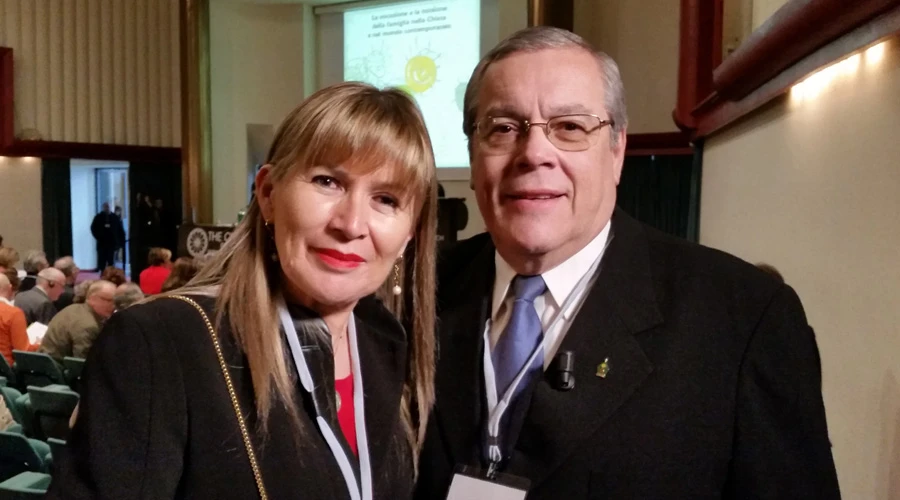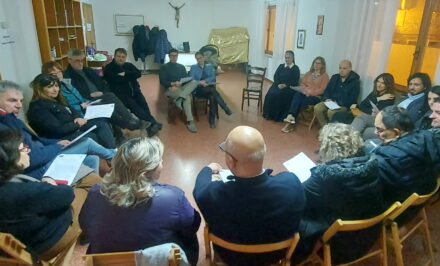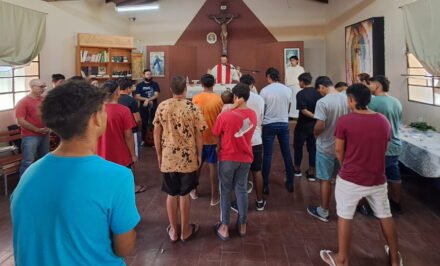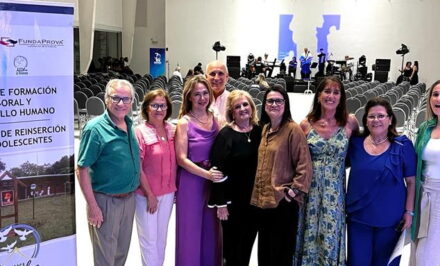 VATICAN/PARAGUAY, mda. Stella and Víctor Domíguez, from the Schoenstatt Family Work, presented the testimony of Pastoral Service to divorced, separated, and remarried people has almost gone viral via the media. There have been interviews on important news outlets such as ACIprensa, Zenit and Aleteia. The Domínguez couple’s presentation was made during the International Congress of Movements, Groups and Family and Life Associations. The Vatican Pontifical Council for the Family organized this Congress, which took place January 22–24 in Rome. Here we are publishing the article by Ary Waldir Ramos Diaz from Aleteia.org anew. During the past week, this article has been one of the most read articles from this news outlet.
VATICAN/PARAGUAY, mda. Stella and Víctor Domíguez, from the Schoenstatt Family Work, presented the testimony of Pastoral Service to divorced, separated, and remarried people has almost gone viral via the media. There have been interviews on important news outlets such as ACIprensa, Zenit and Aleteia. The Domínguez couple’s presentation was made during the International Congress of Movements, Groups and Family and Life Associations. The Vatican Pontifical Council for the Family organized this Congress, which took place January 22–24 in Rome. Here we are publishing the article by Ary Waldir Ramos Diaz from Aleteia.org anew. During the past week, this article has been one of the most read articles from this news outlet.
Mercy is the word summarizing the actions of a Paraguayan couple, which came to the Vatican to give witness to their pastoral mission. Víctor (age 63) and Stella (age 60) Domíguez participated in the Congress of Movements, Groups and Family Life Associations held in Rome on January 22-24. Divorced people, remarried couples and also homosexuals accompanied them.
In Rome they represented the Pastoral Service of Hope whose objective is to “welcome those who are divorced and remarried and assist them to live in Christ, helping them to feel they are an important part of the Church by showing them that they continue being children of God.”
The couple belongs to the Schoenstatt Movement in Paraguay. They have been married for thirty-nine years and have six children, four of whom are married, and they have three granddaughters and another grandchild on the way.
Not all is rosy
Víctor and Stella confirm that not all is “rosy” in a couple’s relationship, but there is a key for a couple’s happiness. Víctor with a voice of one in love said: “I have a mission to make Stella happy. If I make the effort to make my wife happy, and she me, this is the key and to not let go of Christ.”
Has it been difficult to live your relationship with your wife? “Yes, there were difficult moments, but the best are equal to 99%,” Víctor said in a convincing tone.
“After seven years of marriage, we began working as a couple to help others, and then we joined the Pastoral Service to the Family of the Church in Paraguay,” comments Stella.
The majority of the population in Paraguay is Catholic, 6. 4 million; 6.1 million follow the Pope and the teachings of the Church; there are fifteen dioceses and 367 parishes.
They need to feel the love of the Church
The topic of the divorced and remarried is not new or foreign to the reality of the local Church. In this regard, the Domínguez believe that “pastoral love” for them “should be noted, not only in the announcements or talks, but in practice. It is not sufficient to know that the Church loves them. They need to feel it […], show them that they continue being children of God.”
Six dioceses have been developing the Pastoral Service of Hope, and with the bishops’ collaboration throughout the entire country, there are plans to extend it. The challenge is to apply mercy in parishes and other places to welcome wounded families (those separated, divorced, not remarried, remarried, and one-parent families).
“We first speak of growing in faith. Mercifully welcoming, but stemming from truth. Helping them know the love of God. They are as loved by God as [those in] sacramental marriages,” maintains Stella.
Testimony
In the Pastoral Service of Hope, testimony is important. It is about couples, which accompany and help other couples. “Our testimony is what is worth the most. What comes out of my mouth does not have the same power. A person has to see us living that (matrimonial Christian love) and then they will desire to live the love of God because the Lord is among us, right?” assures Víctor who is also a business accountant and administrator.
He continued: “We married each other, but the third person in our relationship is Christ […]. Blessed Mary always intercedes for us in our difficult moments.” A couple lives moments of anxiety when there is thirst and hunger and the husband says to the wife: ‘darling, this is yours, take it, here it is,’ ” he added.
“When a marriage is in crisis, I ask them: How are you with God? They tell me that they have not gone to confession in a long time, that they have not gone to Mass in a long time, that they do not thank God for the present day. It is incredible how we get lost, but this is part of the personal aspect. When we let go of God’s hand, that is when everything goes asunder,” assured Víctor.
To learn more about the Pastoral Service of Hope, read the complete text from the Domíguez couple published on the Pontifical Council for the Family website.
Original: Spanish. Translation: Carlos Cantú, Schoenstatt Family Federation, La Feria, Texas USA 02082015













